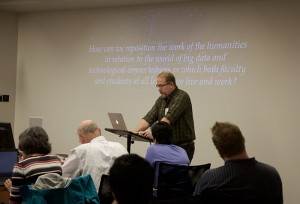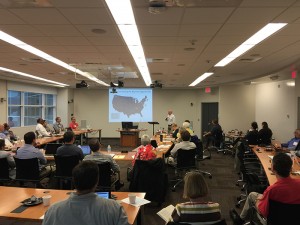When you put more than 50 faculty members, center directors, and researchers from 30 different campus units in a room, ideas are inevitable. However, all the attendees at the Data@Carolina Workshop last week agreed on one point: The explosion of data presents educational and research opportunities across the Carolina community, and Carolina must take a strategic approach to capitalize on these opportunities.
The variety of faculty and administrators who attended Data@Carolina, held at RENCI on
Friday, Sept. 25 and co-sponsored by The Odum Institute for Research in Social Science, attests to the multidisciplinary nature of digital data as a tool in research and education as well as a field that desperately needs additional educational programs.
Technical disciplines (math, statistics, computer science, library and information science) were well represented, as were the medical and life sciences (pharmacy, genetics, public health, neuroscience, nursing, and psychology). The workshop attendees also made it clear that fields such as political science, journalism, environmental science, business, economics, history, and English increasingly utilize and create data in their day-to-day endeavors.
The workshop challenged attendees to begin developing a comprehensive campus-wide big data strategy that addresses educational needs as well as the needs of researchers who want to collect, analyze, share, and store large complex data sets. Ideas presented fell into three general categories.

Presenters from across campus spent time sharing the data questions they find most important. (pictured: Will Bosley speaking for the UNC Digital Innovation Lab)
Undergraduate education
Virtually every career in the 21st century requires data literacy, which means the issue must be addressed in undergraduate education programs. Ideas discussed included a required data science course for all undergrads; a two-year, university-wide theme of data science and data literacy for the campus; and an undergraduate minor related to data.
Graduate education
As more disciplines and industry sectors need data specialists, the need for data education beyond the undergraduate level continues to grow. New programs could include a fast-track professional master’s degree program aimed at working professionals, certificates aimed at current workers, development of a core data studies curriculum for all graduate students in data-intensive majors, and a revenue model for sustaining such programs.
Research
The wealth of digital data means that researchers have an unprecedented opportunity to use data to solve problems related to health, the environment, and public policy, and for artists and humanists to use data creatively for understanding and self expression. However, data-intensive research requires technical infrastructure, including access to computational capacity and cloud computing, advanced networking, and the ability to share and store data while keeping it safe. As the data revolution evolves, Carolina must provide resources and incentivize the kind of multidisciplinary team-oriented research efforts needed for data-driven research.
While Data@Carolina was a day full of ideas and inspiration, organizers Jay Aikat, a research assistant professor of computer science and domain scientist at RENCI; Stan Ahalt, director of RENCI; Tom Carsey, a political scientist and director of The Odum Institute; and Kevin Jeffay, chair of the computer science department, stressed that the workshop was only the beginning of a long-term effort to develop a cohesive and inclusive campus-wide data initiative.
“Our state is known as ‘First in Flight;’ now we want our flagship university to be First in Data,” said Ahalt. “With this workshop we have launched that effort.”
For more information, read the workshop report.



